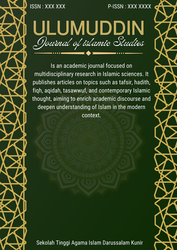The Implications of Sufi Values in Islamic Religious Education in the Modern Era
DOI:
https://doi.org/10.62824/se74mg86Keywords:
Islamic Education, Sufism, Modern EraAbstract
This research aims to enhance understanding of Islamic religious education through the integration of Sufi values. Using a qualitative approach, the study explores the core teachings of Islam, which were delivered by the Prophet Muhammad (PBUH) and directly revealed by Allah (SWT). The research emphasizes the importance of monotheism in Islam, which is eternal and foundational to its principles. Islam, as a complete way of life, offers a balanced integration of material and spiritual aspects, promoting harmony between individuals and society. This paper also highlights the Quran’s authenticity and the unchanging nature of its teachings. The role of Sufism, with its focus on spiritual development and character-building, is examined in the context of modern Islamic education. The values of Sufism, such as sincerity, humility, patience, and gratitude, are discussed as essential in fostering positive character traits among students, especially in the face of contemporary challenges. The findings suggest that incorporating Sufi principles in educational practices can counterbalance the negative influences of modern materialism and contribute to the formation of morally upright individuals.
Downloads
Published
Issue
Section
License
Copyright (c) 2025 Abhi Rizki Fadilah (Author)

This work is licensed under a Creative Commons Attribution 4.0 International License.






